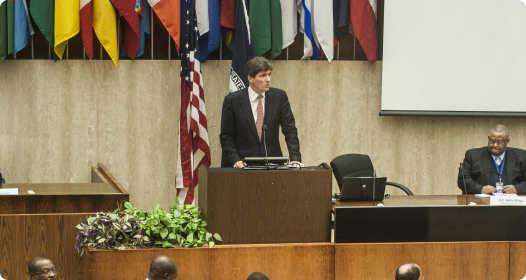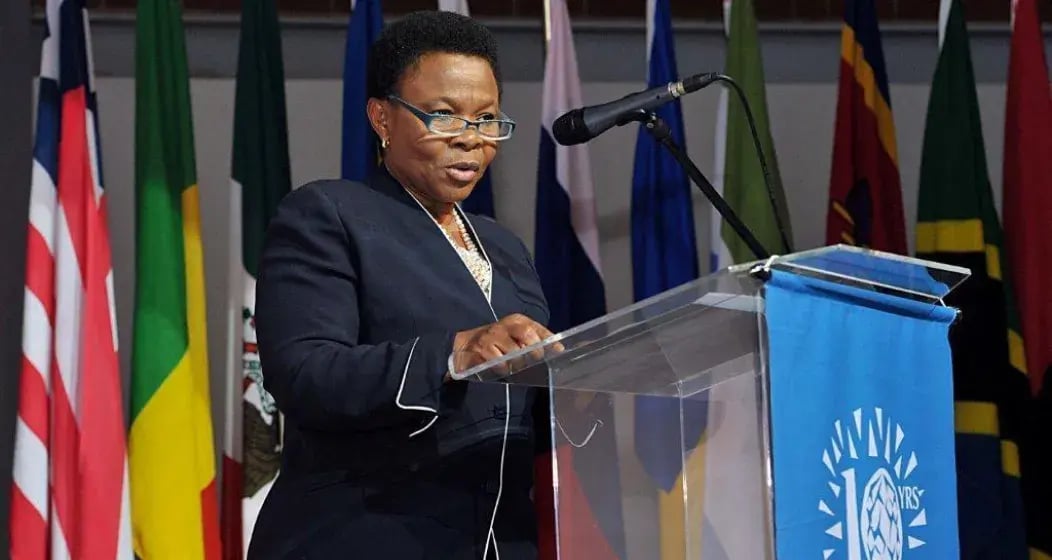- About KP
- What is the KP?
What is the Kimberley Process?
The Kimberley Process (KP) is a commitment to remove conflict diamonds from the global supply chain. Today, participants actively prevent 99.8% of the worldwide trade.
Conflict-free diamonds,
global trust

Defining conflict diamonds
Conflict diamonds qualifies the rough diamonds used by rebel movements or their allies to finance armed conflicts aimed at undermining legitimate governments.

Kimberley Process: United in eradicating conflict diamonds
The Kimberley Process (KP) unites governments, industry, and civil society to eradicate the global trade of conflict diamonds. By enforcing rigorous certification protocols and compliance assessments, the KP ensures that all participating countries maintain high standards that keep conflict diamonds out of the international market.
The Kimberley Process Certification Scheme
Participants in the KPCS must comply with the following fundamental requirements:
.png?upscale=true&width=140&name=Frame%20119%20(3).png)
Enforcement of regulations
Participant countries must enforce stringent legal and regulatory standards to control the import and export of rough diamonds and ensure adherence to KP requirements.

Principles of transparency
Participants commit to transparent practices, which are crucial for the integrity of the diamond supply chain, by exchanging accurate and timely statistical data.
.png?upscale=true&width=140&name=Frame%20119%20(1).png)
Selective trading protocol
Trade is permitted only between certified KP members who comply fully with these international standards, safeguarding the legitimacy of the diamond trade.
.png?upscale=true&width=140&name=Frame%20119%20(2).png)
Verification of exports
Every diamond export is closely inspected and must be accompanied by a valid KP certificate, certifying that the diamonds are conflict-free to prevent the entry of illicit stones into the market.
.png?upscale=true&width=140&name=Frame%20119%20(3).png)
Enforcement of regulations
Participant countries must enforce stringent legal and regulatory standards to control the import and export of rough diamonds and ensure adherence to KP requirements.

Principles of transparency
Participants commit to transparent practices, which are crucial for the integrity of the diamond supply chain, by exchanging accurate and timely statistical data.
.png?upscale=true&width=140&name=Frame%20119%20(1).png)
Selective trading protocol
Trade is permitted only between certified KP members who comply fully with these international standards, safeguarding the legitimacy of the diamond trade.
.png?upscale=true&width=140&name=Frame%20119%20(2).png)
Verification of exports
Every diamond export is closely inspected and must be accompanied by a valid KP certificate, certifying that the diamonds are conflict-free to prevent the entry of illicit stones into the market.
The Kimberley Process organisational framework
The Members
The KP brings together diverse groups representing key stakeholders across the diamond industry, fostering a uniquely collaborative environment through its tripartite structure.

Participants

Observers
Industry and civil society groups that play a pivotal role in monitoring the effectiveness of the KP, offering insights and support to strengthen the certification scheme.
KP governance

Chair
Lead and coordinate the KP, ensuring effective implementation and preparation for leadership succession.

The KP Subsidiary Bodies & Working Groups
Develop and oversee initiatives that support and enhance the KPCS, addressing challenges and promoting ethical practices within the industry.
How to join the KP?
The Kimberley Process is an international forum of negotiations that welcomes new countries that are interested to join this endeavour.
.png?width=383&height=205&name=Frame%20130%20(2).png)
Candidates
Nations aspiring to join the KP, working towards fulfilling the necessary criteria to become full participants.

How to join?
Learn the steps required to become a candidate for Kimberley Process membership.
History of the Kimberley Process
The Kimberley Process started when Southern African diamond-producing states met in Kimberley, South Africa, in May 2000, to discuss ways to stop the trade in ‘conflict diamonds’ and ensure that diamond purchases were not financing violence by rebel movements and their allies seeking to undermine legitimate governments.










2000

2002

2003

2010

2012

2013

2016

2022



